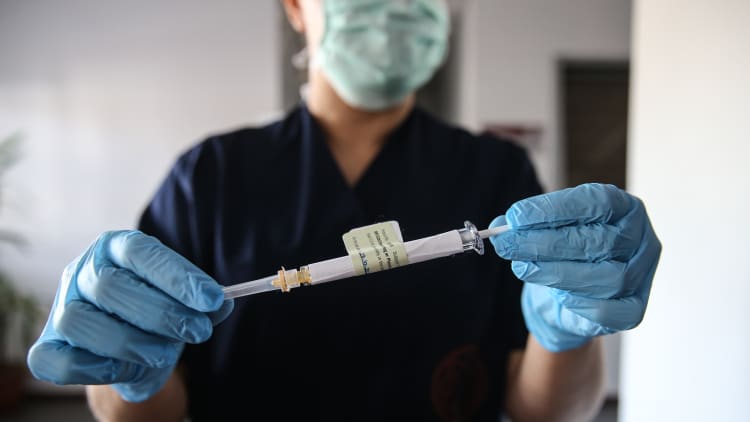
LONDON — The U.K.'s groundbreaking decision to grant emergency approval to Pfizer and BioNTech's coronavirus vaccine will likely lead other countries to quickly follow suit, according to one economist.
Regulators in the rest of Europe and the U.S. have yet to decide on granting emergency use of the vaccine, which was developed by the U.S. pharmaceutical giant and its German partner.
The U.K. government announced Wednesday that it had accepted a recommendation from the country's independent drug regulator, the Medicines and Healthcare products Regulatory Agency, to approve the vaccine, which was seen to be 95% effective at preventing Covid infections in late-stage clinical trials.
The U.K. is the first to formally approve the Pfizer vaccine, its CEO calling the decision a "historic moment" in the fight against the pandemic.
"The U.K.'s approval will be only one of many, but along with that of the U.S. Food and Drug Administration and the European Medicines Agency, it is likely to set the pace for the rest of the world — and for the other vaccines that are awaiting approval," said Ana Nicholls, managing editor of the Industry Briefing at The Economist Intelligence Unit.
"For the U.K., it means that the priority groups can now start to get vaccinations immediately: that includes healthcare workers and those in care homes (staff and residents) followed by other vulnerable groups — although given two doses are needed the effects won't be felt until early next year."
Pfizer and BioNTech only applied to the European Medicines Agency for the conditional marketing authorization of its vaccine on Tuesday. If the authorization is granted, it could enable its use in Europe this month, although that could prove ambitious given that the EMA said it would only complete its review of the vaccine by Dec. 29.
It also said it would conclude its review of Pfizer's rival coronavirus vaccine, developed by Moderna and seen to be 94% effective at preventing Covid infection, by Jan. 12.
In the U.S., the FDA said late last month that it had scheduled a meeting of its Vaccines and Related Biological Products Advisory Committee on Dec. 10 to discuss the Pfizer/BioNTech request for the emergency use authorization, so a decision could be announced soon after.
Good news for the UK?
The U.K. has an agreement for 40 million doses of the vaccine, meaning that it will have enough doses to vaccinate around 20 million population because it's a two-dose treatment.
Some eyebrows were raised at the speed of the U.K. regulator's approval, with one EU lawmaker calling the decision "problematic" and "hasty."
That was rebuffed by one expert who told CNBC that any regulator would scrutinize the available data before authorizing any vaccine candidate and that faster authorizations could become the norm.
"The regulators would not have approved this particular vaccine candidate if they were not happy with the safety profile of it, and also the apparent levels of effectiveness of it," said Michael Head, senior research fellow in global health at the U.K.'s University of Southampton.
"The regulators set up the guidelines for approval in advance, the manufacturing was done as much as possible in advance, too, which doesn't normally happen," he said. "So there are lots of things that have happened for the first time here that haven't happened with the development of other vaccines or medicines. I think it may possibly be, to some extent, a model for how to work going forward [and] that we can do these things in a shorter period of time."
Asked whether the authorization was specifically good news for the U.K., Head said: "Well, if you have it approved you can start to use it, so certainly here in the U.K. it's good news for us. But the pandemic does not end globally until we vaccinate most of the world, so we do need rollout to everyone."
The U.K. has the third highest number of cases in Europe, after France and Spain, with over 1.6 million confirmed infections, and the largest death toll in the region, with almost 60,000 fatalities due to Covid. Its economy is expected to be the one of the worst hit in Europe in 2020, with the World Economic Forum predicting a 9.8% slump in gross domestic product.
Whether the U.K. could gain a competitive economic edge by vaccinating earlier remains to be seen and this will depend on the forthcoming rollout.
"The key, from a market perspective, is what does the vaccine allow to happen in terms of economies that open up — and companies get back to doing what companies do, and consumers doing the things they do — and some degree of normality in terms of profitability and earnings," said Mark Phelps, CIO of concentrated global growth at Alliance Bernstein.


